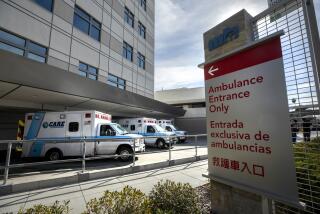House Calls Added to Hotel Room Service Menu
- Share via
Business travelers who get sick on the road may have a better chance of getting a doctor to make a house call than they would at home.
About 14,000 to 15,000 people a year in the U.S. have been using a rapidly expanding service that promises to put a doctor at your hotel room door within minutes--and send a replacement free of charge if you don’t like the first one.
Ian Becker, president of San Diego-based HotelDocs Inc., said his company’s service is now available in 65 U.S. cities, will spread to more than 100 by the end of the year and hopes to be in a few capitals internationally next year.
No registration or advance arrangements are required. A traveler who takes ill calls (800)HOTELDR and Becker’s company dispatches a physician, any time of the day or night.
It costs $150 “credit card, check, cash, anything,” Becker said. The fee does not include medicine or supplies. The doctor gets about 75% of the fee, Becker’s company gets the rest.
It also handles all the billing, guaranteeing that the doctor will be paid in seven days and collecting from the customer itself.
Becker said the service has been advertised in airline magazines, in-room lodging publications and other sources, but word-of-mouth endorsements have been significant in the idea’s growth.
“We treated the chairman of General Motors a year ago and he was so impressed he told a lot of his top executives about it,” he said.
“There have been a lot of celebrities from the start--Liza Minnelli has used us, Demi Moore, Kevin Costner, the Rolling Stones, Joan Rivers,” Becker said.
“But every day, every hour, we’re treating just the regular family on vacation or the regular businessman who wakes up sick . . . We’re about salvaging business trips for the guy who’s away from home 200 days a year and has an important presentation to make,” he said.
“Insurance companies love us,” Becker said, adding that customers have had little trouble with reimbursements and that the charge for treatment is cheaper than some alternatives, such as visiting an emergency room.
Finding the right doctors to be on call is the most important and difficult part of running the service, which has been in operation since 1988, Becker said.
“You need to find a doctor who’s willing to get up at 2 in the morning and go into a strange hotel room to help someone he’s never seen before,” Becker said.
Only three or four out of a hundred potential physicians winds up being recruited, he said, in part because it’s often hard to find someone with the right kind of personality to take on the job.
*
A Boston company said it is finding plenty of demand for its business--installing fully equipped, office-style personal computers in hotel rooms, giving travelers a familiar and easier way to work, print and communicate on the road.
“We want a technology that mirrors the average office,” said David Spier, executive vice president of Aegis Systems Inc. The company, supported by Hewlett-Packard Co., uses and maintains that company’s 486-based desktop units equipped with inkjet printers and a complete set of accessories.
Many travelers gladly put the laptop aside once in their room when given the chance to work on full-scale equipment, he said. The guest pays from $25 to $35 a day extra for a PC-equipped room.
Aegis “treats the hotels as distributors,” Spier said. “We set the prices. The revenue is collected from the guest by the hotel, and we share it with the hotel.”
He said some hotels are shying away from the much-touted business centers installed during the last few years because guests increasingly prefer to work in the privacy of their own room.
“A lot of them carry laptops because they have no alternative,” he said.
At the Guest Quarters-Doubletree Hotel in Chicago, where two rooms have been equipped with the SmartDesk and guests pay an extra $25 a night for the convenience, a spokesman said the rooms are popular.
*
What happens to frequent-flier mileage when the account holder dies?
There is no set industry standard, according to frequent-flier expert Randy Petersen of FlightPlan Inc. in Colorado Springs, Colo.
“But most people in that situation are able to use the miles of the departed one . . . because in essence they are usually transferable within a family,” he said.
The process may vary by airline. Consumer Reports Travel Letter, for example, said recently that TWA’s policy allows heirs to have awards issued from the deceased’s account for their own use or in some cases lets the heir transfer his or her mileage into the account of the deceased.
Michael Conlon writes for Reuters News Service. If you have experiences to share or suggestions for Executive Travel, please write: Executive Travel Editor, Business Editorial, Los Angeles Times, Times Mirror Square, Los Angeles, CA 90053; fax (213) 237-7837; or e-mail to business@latimes.com
More to Read
Inside the business of entertainment
The Wide Shot brings you news, analysis and insights on everything from streaming wars to production — and what it all means for the future.
You may occasionally receive promotional content from the Los Angeles Times.










